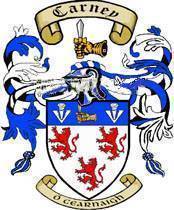| |
|
Carney & Wehofer Family
Genealogy Pages
|
 |
|
 345 - 400 (55 years) 345 - 400 (55 years)
-
| Name |
Balamber (Balamir) (Fara Mond) (King Of The Huns) |
| Born |
345 |
| Gender |
Male |
| _UID |
F2B1C4BD44D6403C886B1879EC8ACA95135F |
| Died |
400 |
| Person ID |
I8734 |
Carney Wehofer 2024 Genealogy |
| Last Modified |
5 Feb 2012 |
-
| Notes |
- The authentic history of the Huns in Europe practically begins about the year A.D. 372, when under a leader named Balamir (or, according to some MSS., Balamber) they began a westward movement from their settlements in the steppes lying to the north of the Caspian. After crushing, or compelling the alliance of, various nations unknown to fame (Alpilzuri,Alcidzuri, Himari, Tuncarsi, Boisci), they at length reached the Alani, a powerful nation which had its seat between the Volga and the Don; these also, after a struggle, they defeated and finally enlisted in theirservice. They then proceeded, in 374, to invade the empire of theOstrogoths (Greutungi), ruled over by the aged Ermanaric, or Hermanric,who died (perhaps by his own hand) while the critical attack was stillimpending. Under his son Hunimund a section of his subjects promptly madea humiliating peace; under Withemir (Winithar), however, who succeededhim in the larger part of his dominions, an armed resistance wasorganized; but it resulted only in repeated defeat, and finally in thedeath of the king. The representatives of his son Witheric put an end tothe conflict by accepting the condition of vassalage. Balamir nowdirected his victorious arms still farther westward against that portionof the Visigothic nation (or Tervingi) which acknowledged the authorityof Athanaric. The latter entrenched himself on the frontier which hadseparated him from the Ostrogoths, behind the ? Greutungrampart ? and theDniester; but he was surprised by the enemy, who forded the river in thenight, fell suddenly upon his camp, and compelled him to abandon hisposition. Athanaric next attempted to establish himself in the territorybetween the Pruth and the Danube, and with this object set aboutheightening the old Roman wall which Trajan had erected in north-easternDacia; before his fortifications, however, were complete, the Iluns wereagain upon him, and without a battle he was forced to retreat to theDaflube. The remainder of the Visigoths, under Alavivus and Fritigern,now began to seek, and ultimately were successful in obtaining (376), thepermission of the emperor Valeirs to settle in Thrace; Athanaricmeanwhile took refuge in Transylvania, thus abandoning the field withoutany serious struggle to the irresistible Huns. For more than fifty yearsthe Roman world was undisturbed by any aggressive act on the part of thenew invaders, who contented themselves with overpowering various tribeswhich lived to the north of the Danube. In some instances, in fact, theHuns lent their aid to the Romans against third parties; thus in 404?405certain Hunnic tribes, under a chief or king named Uldin, assistedHonorius in the struggle with Radagaisus (Ratigar) and his Ostrogoths,and took a prominent part in the decisive battle fought in the neighbourhood of Florence. Once indeed, in 409, they are said to have crossed the Danube and invaded Bulgaria under perhaps the same chief(Uldin), but extensive desertions soon compelled a retreat.
There are lineages online showing him as the son of a Liu, son of Chinese Emperor Liu Yao Shi (280-329). However, this is not documented.
Wu Chu Liu's mother was not a Hun princess. And, Atilla could not have descended from Wu Chu Liu, because the latter was the progenitor of Southern Hsiung-Nu khans. Atilla apparently stemmed from the Northernbranch of Hsiung-Nu. -- Igor Sklar, GEN-MEDIEVAL, 2 Feb 2003
|
|
|
|